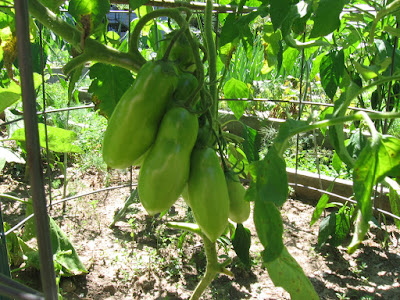Some of the Super San Marzano tomatoes have blossom end rot, or BER. It's not nearly as bad as last year, when nearly all of the initial set of tomatoes was lost. Last year the month of June was extremely wet and cloudy, perfect conditions for BER. It's hard to say why this happens, because the weather has been mostly sunny and the bedrock in these parts is limestone. Maybe this variety of tomato is just more prone to BER. The Big Beef slicing tomatoes have none.
That looks like a lot but the tomatoes are small, probably about an ounce, so the plants have not invested a lot of energy into them. They will never get larger because the growing tip is gone, and ultimately they will rot on the vine. It may be that the plants have 'got it out of their system.' I'm not seeing any more signs on the newly set tomatoes, and the very first tomatoes did not get any BER, in fact they are looking very nice. This variety can get quite large for a sauce tomato, around 6 ounces. Many of them will go into salsa.
I noticed that a jalapeno plant has already produced some peppers. A few went into an omelette this morning.
The Kentucky Blue pole beans are showing some infection from???? Newly set leaves turn wilty, then brown and die. The Fortex beans are not having this problem, they look very healthy. Years ago I tried growing Kentucky Blue and thought they were a delicious bean. That year the Japanese beetles got most of the plants, so I thought I'd give them another go.
Then there's the mystery squash. This is supposed to be Burpee's 'Italian ribbed zucchini' which is just their name for a Cocozelle summer squash, which I grow every year and ran out of seeds so these were bought at the hardware store. But this squash - if you look close you can see it - is clearly not ribbed, it is glossy smooth and very dark green. At least the plant is very healthy but I may never know what this is.
Again this year the apple trees have cedar apple rust. They got it very bad last year and by summer's end many of the leaves were lost. This spring I sprayed them twice with Mancozeb, a fungicide. I chose Mancozeb because it decomposes quickly. It doesn't look as bad as last year. The Golden Delicious gets it worse than the Fuji.
This is the first year the apple trees have set a 'crop' of apples. I'm a little surprised at how much the apples bend down the branches of the tree.
The two gigantic dill plants continue to mature. I've pruned them judiciously to let more light get through to the okra on their north. They should make enough dill seed to last a few years.








5 comments:
There are so many diseases out there to beset our crops! With our current dull high-humidity weather I'm almost expecting blight to appear any day now... At least your Dill crop will be ample.
Mancozeb is not for organic gardening, right? I'm not making a statement, just looking for a fungicide that might be considered organic but will be effective for our grapevines and the brown rot they are prone to.
The BER is disconcerting, it looks like you're still getting good fruit set on your tomatoes. And your jalapeno plant is setting lots of peppers, so great. The temperatures are borderline for our pepper plants, lots of blossom drop with the occasionally pepper set.
Oh, that's too bad about the tomatoes - I had a lot of BER issues last year and I attributed it to lack of water (in that the plants were not taking up very much calcium from the soil). The worst of the bunch for me was Opalka - I think I ended up throwing out over half of the tomatoes.
I hope you end up getting some sort of bean harvest. I had Bacterial Brown spot on the beans for a few years but the good news is that I was still able to harvest a good batch of beans before the plants called it quits.
Eight Gate - No I'm sure it's not organic, it's a synthetic compound. I did a little research on what to use for cedar apple rust and Mancozeb is one of the recommended fungicides. It is not systemic and degrades quickly, so it seemed like the best choice. As a retired chemist the label 'organic' doesn't carry as much weight for me, a chemical is a chemical whether it comes from a plant or a laboratory, and plants can make some really toxic chemicals. I'd recommend doing some research on the web to help make a decision. Sometimes the best approach is to find a way to modify the plant's environment.
Post a Comment